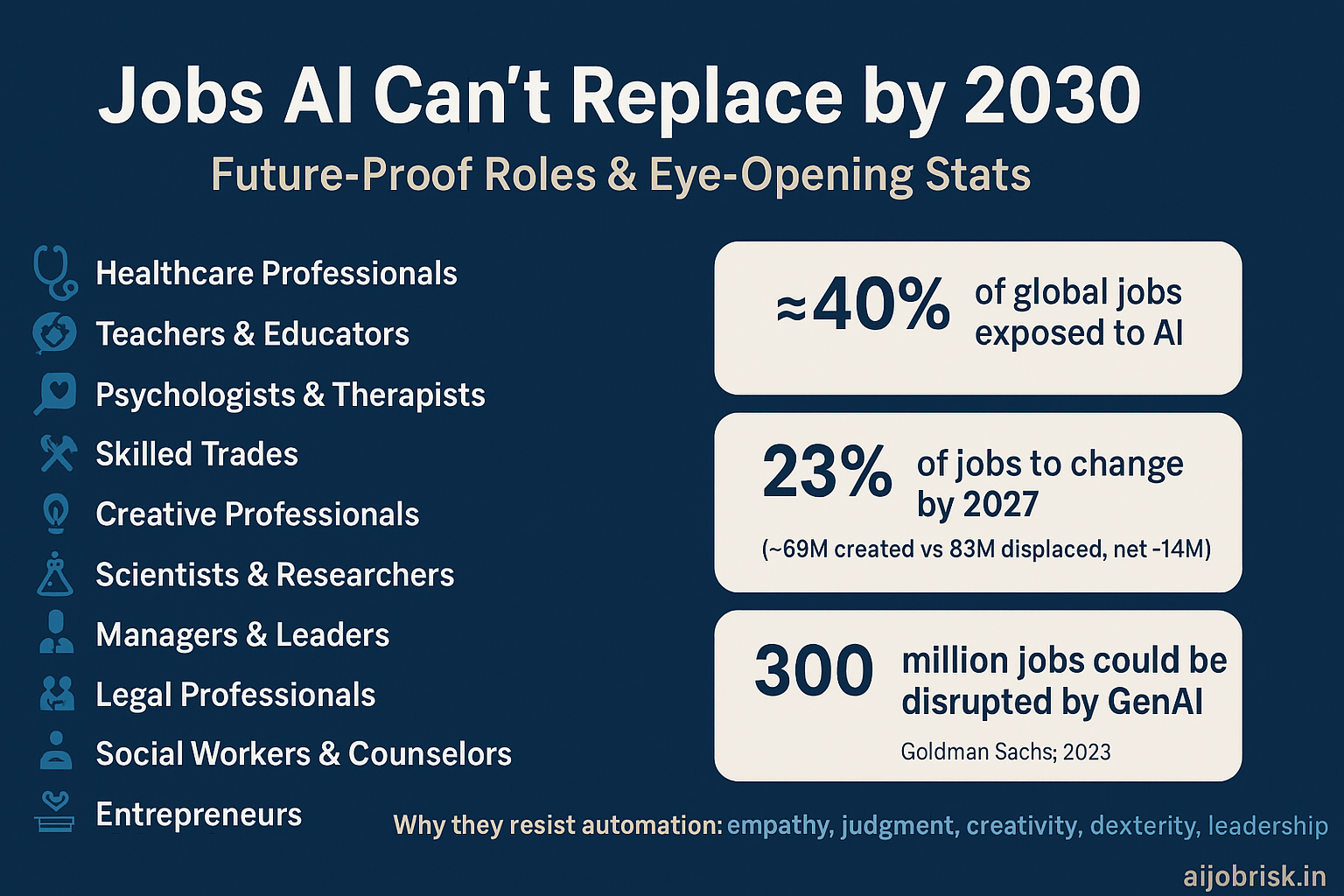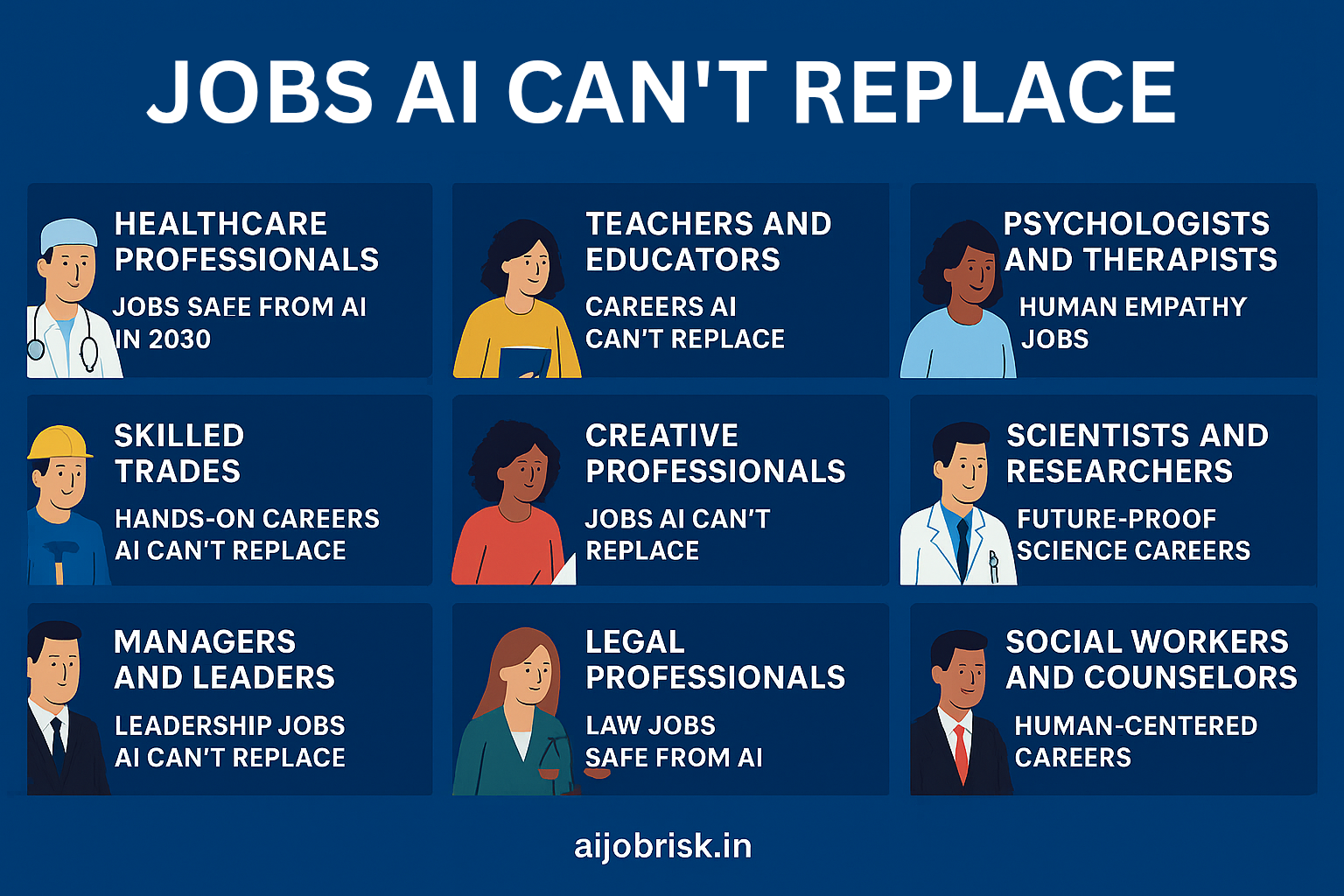The rise of Artificial Intelligence is no longer a prediction for the future, it’s happening right now. From chatbots handling customer queries to self-driving cars being tested on our roads, AI is reshaping industries at lightning speed. Naturally, this raises a big question: Which jobs are safe, and which could disappear by 2030?
The truth is, while AI is excellent at automating repetitive tasks and crunching data, there are certain jobs it simply can’t replace. These careers depend on creativity, emotional intelligence, problem-solving in unpredictable situations, and the kind of human connection no machine can replicate.
In this article, we’ll explore 10 jobs AI is least likely to replace by 2030, and more importantly, the future-proof skills you can build today to stay ahead in an AI-driven world.
1. Healthcare Professionals: Jobs Safe from AI in 2030
AI has made major strides in medicine, from analyzing scans to robotic surgery. Yet, healthcare professionals such as doctors, nurses, and surgeons remain irreplaceable. Medicine is not just about data but about empathy, ethics, and judgment.
Why AI can’t replace them:
- AI may detect patterns in scans but can’t build trust or comfort a patient.
- Doctors must make life-or-death decisions under uncertainty.
- Nurses provide emotional support and act instantly in emergencies.
Example: An AI system may suggest a cancer diagnosis, but only a doctor can weigh treatment options, explain risks, and reassure a distressed patient.
AI limitations:
- Can’t handle unpredictable symptoms or complex cases with overlapping conditions.
- Lacks the ability to comfort families or navigate ethical dilemmas.
Future-proof skill:
Blend medical expertise with AI tools (diagnostic platforms, electronic health records, robotic assistants) to improve efficiency while staying human-centered.
2. Teachers and Educators: Careers AI Can’t Replace
AI can deliver lessons or answer basic questions, but teaching is far more than transmitting information. It’s about inspiring, motivating, and guiding students.
Why AI can’t replace them:
- Students need encouragement, role models, and mentors.
- Teachers adapt lessons to individual strengths and weaknesses.
- Emotional and moral development requires human presence.
Example: A chatbot may help solve a math equation, but only a teacher can notice when a student is struggling silently and offer tailored support.
AI limitations:
- Can’t create real bonds or nurture curiosity.
- Struggles with cultural sensitivity and unique learning needs.
Future-proof skill:
Integrate EdTech and AI-powered tools into lessons, while keeping human connection at the center.
3. Psychologists and Therapists: Human Empathy Jobs
Mental health care depends on empathy, trust, and personal interaction. While AI chatbots may provide basic therapy scripts, they lack human understanding.
Why AI can’t replace them:
- Therapy involves emotions, trust, and subtle non-verbal cues.
- Patients need compassionate listeners who adapt to changing emotions.
- Healing often comes from the relationship, not just the advice.
Example: An AI can suggest coping techniques for anxiety, but only a therapist can sit with a grieving parent, read body language, and offer comfort.
AI limitations:
- No real empathy or emotional intelligence.
- Lacks cultural sensitivity and ethical judgment.
Future-proof skill:
Strengthen emotional intelligence, stay updated with digital therapy tools, and use AI only as a support tool (e.g., tracking patient progress).
4. Skilled Trades: Hands-On Careers AI Can’t Replace
Electricians, plumbers, and carpenters rely on physical dexterity and on-the-spot problem solving — skills automation struggles with.
Why AI can’t replace them:
- Homes and buildings are unique, requiring real-time decisions.
- Tasks often demand flexibility and improvisation.
- Physical presence and manual skill are irreplaceable.
Example: A robot can’t crawl under a sink and adapt to unexpected wiring issues, but a skilled plumber can.
AI limitations:
- Difficulty handling unstructured environments.
- Machines lack dexterity for unpredictable repairs.
Future-proof skill:
Invest in automation-friendly equipment, learn modern tools, and provide excellent customer service to stay competitive.
5. Creative Professionals: Jobs AI Can’t Replace
AI can generate text, music, or images, but true creativity comes from human imagination, originality, and context.
Why AI can’t replace them:
- Creativity reflects culture, emotions, and storytelling.
- Artists, writers, and musicians bring unique perspectives.
- Originality cannot be replicated by algorithms.
Example: AI may compose background music, but only a human songwriter can craft lyrics that resonate emotionally with listeners.
AI limitations:
- Can only remix what already exists.
- Lacks vision, humor, and cultural nuance.
Future-proof skill:
Use AI as a brainstorming tool but keep originality, storytelling, and cultural context at the core.
If you haven’t yet, check out our previous post on jobs AI will replace by 2030 for the full picture.
6. Scientists and Researchers: Future-Proof Science Careers
AI is excellent at data analysis, but true science requires curiosity, hypothesis, and creative problem-solving.
Why AI can’t replace them:
- Scientists design experiments and test theories.
- They interpret unexpected results and adapt research methods.
- Discovery requires imagination, not just computation.
Example: AI can analyze climate data, but only researchers can frame hypotheses about climate change causes and design new studies.
AI limitations:
- Lacks critical thinking and independent judgment.
- Cannot set research agendas or ethical boundaries.
Future-proof skill:
Develop analytical skills while mastering AI-driven tools to accelerate research.
7. Managers and Leaders: Leadership Jobs AI Can’t Replace
Leadership isn’t just about efficiency, it’s about vision, motivation, and conflict resolution.
Why AI can’t replace them:
- Leaders inspire teams and align people with goals.
- Decision-making under uncertainty requires human judgment.
- Motivating people and building trust are human qualities.
Example: AI can suggest schedules, but only a leader can unite a diverse team behind a company’s long-term mission.
AI limitations:
- Cannot inspire or empathize with employees.
- Struggles with human conflict and office dynamics.
Future-proof skill:
Build people-management, communication, and strategic thinking skills to stay indispensable.
8. Legal Professionals: Law Jobs Safe from AI
AI can process legal documents quickly, but law requires ethics, human rights, and contextual judgment.
Why AI can’t replace them:
- Judges, lawyers, and advisors must interpret laws within cultural contexts.
- Negotiation, advocacy, and courtroom presence require human intuition.
- Legal work involves moral and social dimensions machines can’t grasp.
Example: AI can review contracts, but only a lawyer can argue passionately in court to defend a client’s rights.
AI limitations:
- Cannot apply ethical judgment.
- Struggles with nuance in real-world legal disputes.
Future-proof skill:
Leverage AI for legal research, but focus on negotiation, ethics, and courtroom advocacy.
9. Social Workers and Counselors: Human-Centered Careers
Social work thrives on compassion, empathy, and deep human understanding.
Why AI can’t replace them:
- Vulnerable groups need emotional support and trust.
- Counselors build human bonds that machines can’t replicate.
- Advocacy requires creativity and persistence.
Example: AI may help track case data, but only a social worker can comfort an abused child and connect them to resources.
AI limitations:
- Lacks empathy and moral reasoning.
- Cannot build long-term trust in sensitive situations.
Future-proof skill:
Strengthen communication and advocacy skills while using AI tools for data management and case tracking.
10. Entrepreneurs: Jobs AI Can’t Replace
Entrepreneurship is about vision, risk-taking, and innovation — qualities beyond algorithms.
Why AI can’t replace them:
- Entrepreneurs spot opportunities before data shows them.
- They combine intuition, creativity, and persistence.
- Risk-taking and leadership are inherently human.
Example: AI can forecast markets, but only an entrepreneur can dream up a disruptive business idea and rally people to believe in it.
AI limitations:
- Cannot innovate beyond patterns.
- Lacks courage to take risks or pursue uncertain ventures.
Future-proof skill:
Combine AI-driven insights with creative problem-solving to launch new ventures.
Why These Jobs Are Safe from AI
These careers thrive on human qualities AI lacks, including:
- Emotional intelligence
- Ethical decision making
- Creativity and originality
- Physical dexterity
- Vision and leadership
Strengthening these skills will help you remain in jobs safe from AI even as technology evolves.
How to Future-Proof Any Career
Even if your job isn’t on this list:
- Embrace lifelong learning – continually update your skills
- Blend tech with human skills – use AI as a tool, not a competitor
- Focus on adaptability – stay flexible to new opportunities
These steps ensure your career remains future-proof in the AI era.
Frequently Asked Questions (FAQ)
Q1: Will AI replace jobs by 2030?
AI will automate many repetitive and routine tasks, but it won’t replace every job. Careers that rely on empathy, creativity, problem-solving, and human judgment will remain safe, while most workers will see their roles evolve rather than disappear.
Q2: Which jobs are most at risk from AI?
The jobs most at risk from AI are those that are repetitive and rule-based, such as data entry clerks, telemarketers, cashiers, and routine factory workers. These roles are easier for machines to automate because they require little creativity or complex decision-making.
Q3: Which jobs are safe from AI?
Jobs that require human connection and complex judgment are safe from AI. Examples include healthcare professionals, teachers, leaders, skilled tradespeople, and creative professionals. These careers depend on empathy, originality, and decision-making that machines cannot replicate.
Q4: How can I future-proof my career against AI?
You can future-proof your career by developing soft skills like communication, creativity, and leadership, while also learning to use AI tools effectively. Staying adaptable, embracing lifelong learning, and focusing on uniquely human strengths will keep your role secure.
Q5: What industries will grow with AI by 2030?
Industries expected to grow with AI include healthcare, education technology, cybersecurity, data science, and green technology. These fields will benefit from AI advancements while still needing human oversight, innovation, and ethical judgment.
Q6: Should I be worried about AI taking my job?
You don’t need to panic. AI will change how jobs are done, but it won’t eliminate most careers. In many cases, AI will handle repetitive tasks while humans focus on higher-level decisions, creativity, and personal interaction.
Conclusion: The Future of Work in the Age of AI
AI will undoubtedly continue to transform the job market, but that doesn’t mean your career is doomed. The key is to focus on what makes us human: empathy, creativity, adaptability, and real-world problem-solving. Whether you’re a teacher inspiring young minds, a skilled technician fixing problems on-site, or an entrepreneur creating new solutions, your value goes far beyond what algorithms can deliver.
The future belongs to those who are willing to adapt and upskill. Instead of fearing AI, think of it as a tool that can make your work more impactful.
👉 Curious about your own career? Try our [AI Job Risk Calculator] to see how safe your job is from automation and discover what skills can keep you future-proof.
Now it’s your turn: Which of these AI-proof jobs do you believe has the brightest future? And more importantly—how are you preparing your career to stay future-ready? Share your thoughts in the comments below!


